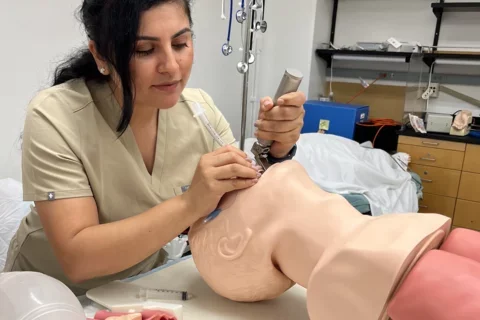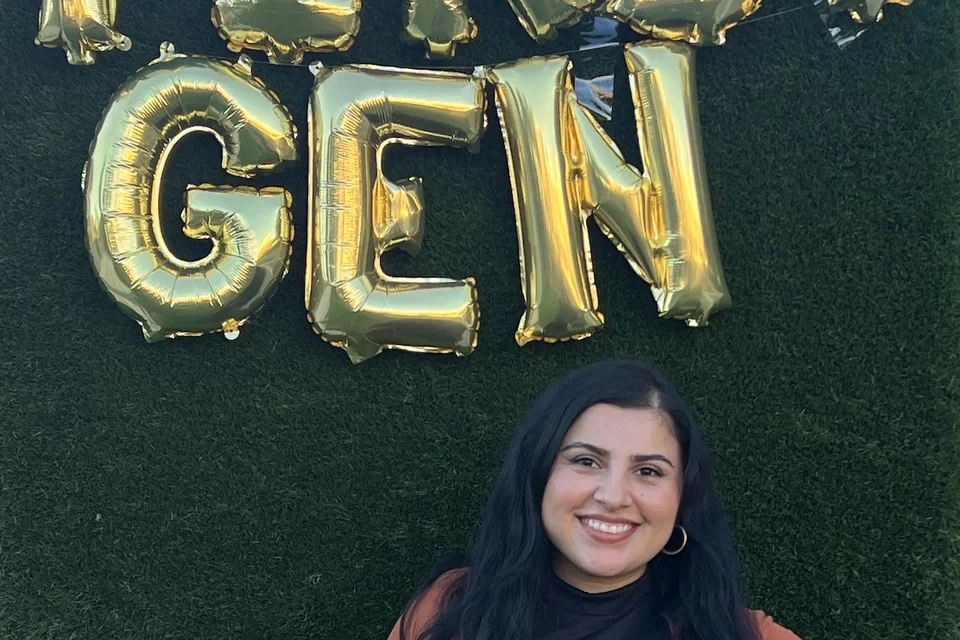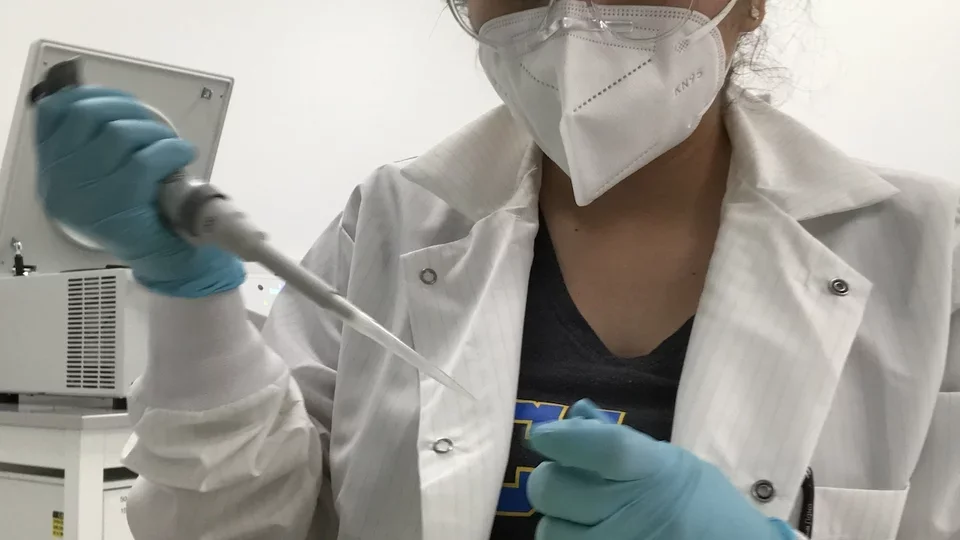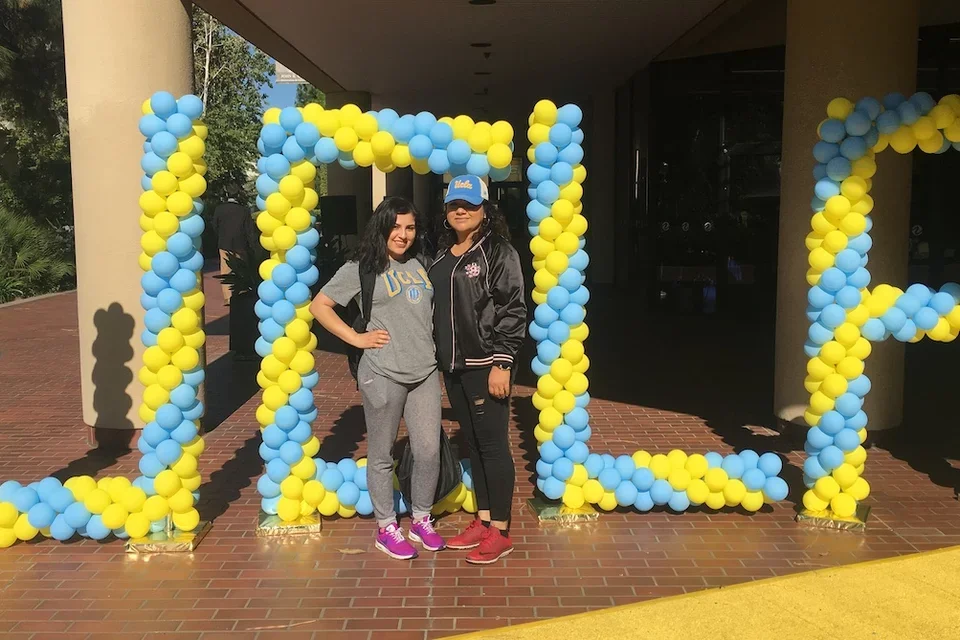Becoming the Physician She Always Wanted to Meet
Student Spotlight

Meet Liliana Perez
Medical student Liliana Perez is a proud first-generation Latina, the daughter of Mexican immigrants.
She became curious about healthcare while growing up in San Pedro, California. All too often, her family members suffered through chronic illnesses but refused to seek medical care.
As a kid, this confused her, making her wonder if doctors were bad in some way. Now she understands her family simply didn’t have access to physicians who looked like them or made them feel safe.
Liliana found a role model in her persevering single mother. She demonstrated that people who looked like them could and should feel safe receiving medical care—and also pursuing medical careers. Liliana watched her mother attend community college and build a career as a licensed vocational nurse (LVN).
“Seeing my mom study and overcome obstacles motivated me to go into a career that allows me to serve others through medicine, through healing, and through compassion,” Liliana says.
While Liliana envisioned a career in medicine, becoming a doctor didn’t cross her mind until community college.
“I didn’t know becoming a doctor was an option for me,” she explains.
A counselor opened her eyes with one powerful sentence: “Just because you don’t see anyone who looks like you becoming a physician doesn’t mean you can’t be that person.”
Fun fact: Liliana possesses a skill becoming increasingly rare among her peers. She knows how to drive a manual transmission.
Seeing Herself as a Change Maker
Thanks to her counselor’s encouragement, Liliana felt inspired to become a doctor. How exactly she could become a doctor seemed less clear. Her counselor helped her identify the next step: Transferring to a 4-year college to earn her bachelor’s degree.
"Being born and raised in Los Angeles county by a low-income family, I never imagined myself pursuing higher education.”
To prepare, she participated in multiple pre med pathway programs, including UCLA's Summer Health Professions Education Program (SHPEP) and the Charles R. Drew University (CDU) Undergraduate Cancer Research Training Program (UCRTP).
She also got first-hand experience in healthcare by working as an emergency medical technician (EMT) in Long Beach, California. She watched how physicians worked in a stressful acute care setting. She treated patients from low-income, African-American, and Latinx backgrounds. She witnessed first-hand the devastating effects of socio-economic and cultural barriers to health.
“I realized it wasn’t just my family. It was my entire community suffering from health disparities.”
Liliana’s goal of becoming a doctor became more specific. She wanted to become a doctor who serves underserved communities.

Committing to Serving the Underserved
Liliana’s extensive preparation paid off. She transferred to the University of California, Los Angeles (UCLA), her first-choice college. There, she earned a bachelor’s degree in science with an emphasis on psychobiology. She also connected with the first Latina physician she’d ever met.
“She really motivated me to continue this path of becoming a physician,” Liliana says.
After graduating from UCLA, Liliana wanted more experience before applying to medical school. She completed a pre med post-baccalaureate program at the University of California, Irvine (UCI) School of Medicine.
The program proved to be exactly what she needed to feel ready for her next steps.
“The program taught me how to actively learn, study effectively, ask the right questions, and take advantage of professors’ office hours,” Liliana says. “It transformed my habits as a student.”
She felt more prepared for medical school than ever but chose to delay her plans when an unexpected obstacle emerged.

During the COVID-19 pandemic, Liliana put her medical school applications on pause so she could help support her family and serve her community as a COVID-19 testing EMT. Listening to patients and providing compassion became even more important and significant during this unprecedented time.
“An illness isn’t the only thing you need to consider when treating a patient,” she says.
She listened to patients who tested positive but didn’t have the means to follow isolation guidelines. She comforted people suffering some of the most sudden and jarring losses of their lives.
Eventually, she transitioned to a role as a research associate doing COVID-19 sequencing at a biotech company. In addition to providing enriching healthcare work experience, Liliana’s pandemic roles opened her eyes to even more health disparities. Both testing and sequencing highlighted the same unacceptable truth, that COVID-19 disproportionately affected Black and Brown people.
For the second time, facing hard truths increased Liliana’s motivation. She knew it was time to apply to medical school.

Living a Dream Come True
She’ll never forget learning she’d been admitted into the David Geffen School of Medicine at UCLA (DGSOM), her top choice.
“I knew all the years of hard work, all the years of uncertainty, all the years of questioning if I belonged in medicine had been worth it,” Liliana says.
Liliana didn’t just get into her first-choice school. She also got into the PRIME-LA concurrent/dual degree program designed to train future healthcare leaders committed to serving underserved populations.
“The program trains doctors to question the system and care for patients that have fallen through the cracks of our healthcare system.”
It’s a dream come true for Liliana, to be a medical student at UCLA, training through PRIME-LA to be exactly the kind of doctor she’s long envisioned.
“I want to be a doctor that my community can trust and feel comfortable with,” Liliana says. “I want to be a physician that provides culturally competent care and empowers patients to make better decisions for their health.”
Liliana, who co-chairs the Latino Medical Student Association (LMSA), also wants to mentor the next generation of Latinx physicians.
“Through my journey in pursuing a career as a doctor, I want to motivate other students and let them know that it doesn’t matter where you start—that anything is possible,” she says.
“If you can’t find a role model, be a role model.”



